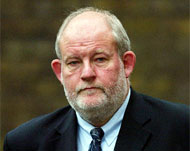Blair insists on UK anti-terror law
Britain’s Prime Minister Tony Blair has failed in a bid to secure cross-party agreement on controversial plans to widen anti-terrorism laws.

But the government said on Friday it would nevertheless introduce the new legislation next week.
“We need to discuss that before parliament. We need to put emergency legislation through. That is what we will do,” Home Secretary Charles Clarke said.
At the centre of what is a potential debacle for the prime minister is a proposal to keep terrorism suspects under house arrest – so called control orders – without trial.
The move has sparked an outrage among civil liberties campaigners and opposition parties, who say judges, not politicians, should decide what happens to suspects.
No consensus
But after a meeting with the leaders of the two main opposition parties there appeared to have been little movement on either side with the government insisting on house arrests and that it would not allow the use of evidence obtained through phone taps in court.
 |
|
Clarke is hoping emergency |
Clarke said the main opposition Conservative Party had rejected outright the government’s proposals, while the smaller Liberal Democrats had been more constructive in their approach.
A softening of the proposed laws could prove as embarrassing as a defeat for Blair just weeks ahead of an expected May election although his spokesman said this week “extreme measures” were necessary to face the threat from terrorism.
Opponents say plans for house arrest without trial are a breach of human rights.
Phone taps
“The primary principle at the centre of all this is whether or not an individual’s liberty can be decided by a politician acting alone without reference to the due judicial process,” Liberal Democrat leader Charles Kennedy said.
|
“The primary principle at the centre of all this is whether or not an individual’s liberty can be decided by a politician acting alone without reference to the due judicial process” |
“That, I think, is an essential hallmark of British democracy.”
The Conservatives and Liberal Democrats also want the government to legislate to permit the use of intercept or phone-tap evidence in court.
Ministers oppose the move, saying it will not lead to more convictions and will put the security services at risk.
Britain’s anti-terrorism laws have been in turmoil since last December when the country’s highest court said the current policy of indefinitely detaining foreign suspects without trial was illegal.
The hastily drawn-up plans for house arrest were announced in January as a response to that ruling.